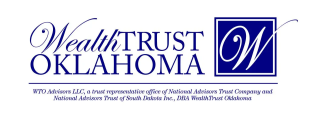Monthly Update for Administration of Trusts and Asset Management
ESTATE PLANNING AND IRA’S
While the concept of an individual retirement account (IRA) seems fairly straightforward, the rules that apply to distributions can be quite complicated. They are even more complex following your death. The Internal Revenue Service has devoted some of the most complicated rules in the book for inherited IRA distributions. A thoughtful estate plan can avoid the additional burden on your heirs having to navigate this complexity.
Pre-tax assets, such as traditional IRA’s and qualified retirement plan balances, require a full understanding on the part of your estate planning team, which hopefully includes your advisor, attorney, accountant and trustee. Non-tax issues must also be taken into consideration, including your plan of distribution and the life plans of your heirs.
Here are some things to consider regarding pre-tax assets when putting together your estate plan:
When it comes to your IRA, the most important document is not your will or trust, it’s the beneficiary designation. Regardless of what the other documents say, the proceeds of the IRA will go to the party named on the beneficiary form. If you have not completed a beneficiary form, it will be paid out according to the default provisions in the IRA account agreement. This is why it’s so important to retain copies of your beneficiary designation forms, review them periodically, and provide up-to-date copies to all members of your estate planning team.
If you have funds that you won’t need during your retirement, consider converting your traditional IRA to a Roth IRA. While you will be paying current income tax on the conversion, the Roth IRA will grow forevermore on a tax-free basis. Moreover, annual required minimum distributions (RMDs) are not required during your lifetime, leaving even more in the account to grow tax-free. However, before deciding to convert a traditional IRA to a Roth, you should consider your current tax bracket to those of your beneficiaries. It may make more sense to leave it as a traditional IRA. Your trusted advisors can assist you in making these complex decisions.
There are multiple types of beneficiaries: Spousal, Eligible Designated, Designated, and Entities such as a trust, estate, etc. A Spousal Beneficiary is, as indicated, a spouse. An Eligible Designated Beneficiary is a minor child of the original account owner or a chronically ill person or a permanently disabled person or a person not more than 10 years younger than the original account owner. A Designated Beneficiary is an individual who does not meet the requirements of an eligible designated beneficiary. This class also includes a see-through trust.
In a Traditional IRA, a Spousal Beneficiary has the following options if inheriting before the IRA owner reached the RMD date: spousal transfer, open an inherited IRA (life expectancy method), open an inherited IRA (10-year method), and lump sum distribution. A Spousal Beneficiary has the following options if inheriting after the IRA owner reaches the RMD date: spousal transfer, open an inherited IRA (life expectancy method), and lump sum distribution.
An Eligible Designated Beneficiary has the following options if inheriting before the IRA owner reached the RMD date: open an inherited IRA (life expectancy method), open an inherited IRA (10-year method), and lump sum distribution. An Eligible Designated Beneficiary has the following options if inheriting after the IRA owner reaches the RMD date: open an inherited IRA (life expectancy method) and lump sum distribution.
A Designated Beneficiary has the following options: open an inherited IRA (10-year method) and lump sum distribution.
Roth IRA beneficiary distribution options are very similar but not identical so please contact us should you have questions.
Regardless of your decisions regarding the disposition of your IRA, it’s a good idea to communicate your intentions to the beneficiary(s). In particular, make sure they understand the RMD rules that will apply. This is an area where your financial advisor can be of great assistance to you.
WealthTrust Oklahoma is the Oklahoma Trust representative office of National Advisors Trust Company. We are independent and hold a federal charter. In addition to trust administration services, we offer investment management services through our firm, WTO Advisors.
Alyssa Kaiser, CTFA, has over 31 years of experience in the trust, investment, and banking industries and is President of WealthTrust Oklahoma and WTO Advisors. Alyssa may be contacted at: (405) 241-1600, or by email at Alyssa@WealthTrustOk.com.

